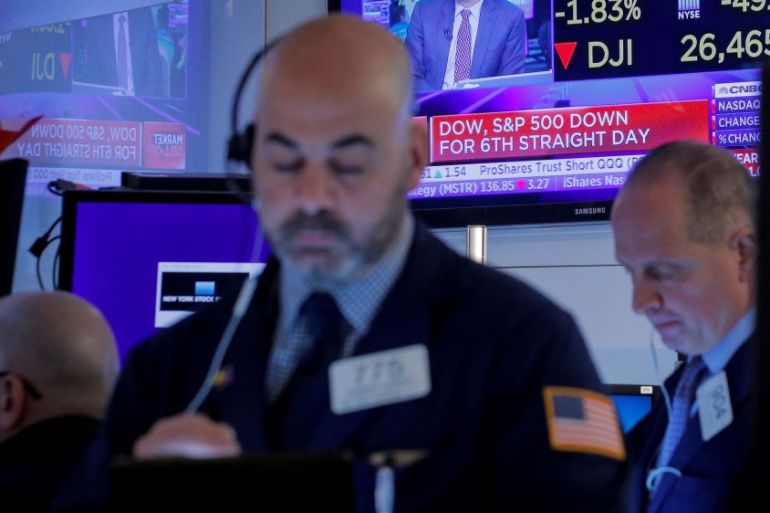Coronavirus fears pound US stocks into ‘correction’ territory
US stock prices drop for sixth straight session in a rout that has wiped out nearly $2 trillion in value.

Wall Street’s main indices slipped into correction territory minutes after the open of trading on Thursday as the rapid spread of the coronavirus outside China deepened worries about economic growth and corporate earnings.
Nearly $2 trillion has been wiped off the value of US equities since Friday, with the S&P 500 and the Dow Jones Industrial Average falling 10 percent from highs achieved earlier this month. A “correction” is defined as a drop in asset value of 10 percent or more.
Keep reading
list of 3 itemsTrump under pressure to ramp up US coronavirus response
Timeline: How the new coronavirus spread
The bloodbath continued in New York on Thursday with the DJIA briefly falling more than 900 points or roughly 3.5 percent before paring some of those losses. It was down around 2 percent in late mornnig trading. The S&P 500 also had a sharp dip before clawing back to a loss of around 2.2 percent in late morning trading.
The rout comes as the number of new infections in China, the source of the outbreak, was overtaken for the first time by fresh cases elsewhere on Wednesday, most notably in Italy and Iran.
On Wednesday evening, President Donald Trump rejected accusations that his administration is not doing enough to address the virus threat. Adding to worries, the US Centers for Disease Control and Prevention confirmed an infection in California in a person who reportedly did not travel to an affected area or exposed to an infected person.
“In the recent week, markets have come to realize that the outbreak is much worse and are now realistically pricing in the impact of the virus on the economy,” said Philip Marey, senior US strategist at Rabobank told Reuters news agency.
“In that sense, it’s a bit of a catching up from the relative optimism that was there in the beginning when markets thought [the virus] will be contained to China with some minor outbreak outside.”
After hitting a record high last week, the S&P 500 has declined for sixth straight sessions and has lost about $1.84 trillion in market capitalisation this week alone.
Industry analysts and economists continue to sound the alarm as they assess the impact of the coronavirus. On Thursday, equity strategists at Goldman Sachs slashed their outlook for profit growth at US companies to zero.
Bank of America also revised its world growth forecast to the lowest level since the peak of the global financial crisis.
Bucking the downward trend in equities is Gilead Sciences, which jumped 5 percent as the drugmaker said it had started two late-stage trials to test its experimental drug in patients with cases of illness caused by the coronavirus.
Risk aversion is roiling stock markets throughout the world as investors dump equities for safe havens like gold, bonds and select currencies.
Global equities have now fallen for six straight days, and Wall Street’s volatility gauge was near its late-2018 highs. Meanwhile, spot gold rose 0.6 percent to $1,649 an ounce, just shy of the seven-year high it hit on Monday.
Yields on US Treasury, which fall when prices rise, dropped below 1.3 percent for 10-year debt and the yield curve continued to send recession warnings.
Markets are pricing a roughly even chance the Federal Reserve will cut interest rates next month and have almost fully priced in a cut by April.
Analysts have downgraded forecasts for Chinese and global growth, and policymakers from Asia, Europe and the US have begun to prepare for a steeper economic downturn.
In Asia, South Korean stocks shed another 1.05 percent on Thursday, closing at a four-month low, as the country reported its largest daily rise in new virus cases since its first infection last month.
With the infection rate in China slowing, the blue-chip CSI300 index finished up 0.3 percent. China’s central bank said on Thursday it would ensure ample liquidity to help limit the impact of the epidemic.
MSCI’s broadest index of Asia-Pacific shares outside Japan fell 0.5 percent, taking it more than 4 percent lower for the week.
The safe-haven yen and the Swiss franc gained on Thursday with the Japanese currency heading towards 110 yen to the dollar, up nearly 2 percent so far this week. The dollar fell 0.32 percent.